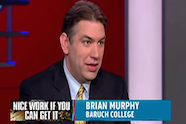Historian finds himself on the front lines of the NJ Bridgegate scandal

Brian Murphy is an historian at Baruch College. Why then did he start showing up on MSNBC when the scandal broke over Chris Christie's role in the closure of lanes on the George Washington Bridge?
It turns out that before he got his Ph.D. he worked briefly as an aide to a New Jersey state senator. Afterwards, he got a job as a reporter on PoliticsNJ.com. Both gigs put him in touch with many of he key players in Bridgegate, which led to his debut as a media pundit.
He recounts what happened in an essay in the latest edition of Common-place:
Sometime after I decided to go to UVA, I briefly took a job with PoliticsNJ.com, run by an anonymous editor who went by the name of a long-deceased governor of New Jersey named Walter "Wally" Edge. Wally, I learned years later, was David Wildstein. David/Wally taught me a lot about power, and one of the more interesting things I observed while working for him was how much power is wielded by people whose names never appeared on a ballot and who operate in a mixed economy where public and private interests collide. In New Jersey, you might think that the political system bends to the will of a small group of public figures: the leaders of the state legislature or the governor, and maybe a few political party bosses and fundraisers. But in truth, some of the most influential political operators can be found at three agencies most people have never heard of: the Casino Redevelopment Authority (think Atlantic City), the Sports and Exposition Authority (which runs the Meadowlands and Giants Stadium), and the Port Authority of New York and New Jersey (in charge of tunnels, airports, the World Trade Center, and of course the George Washington Bridge).
You can read the rest of his story here.